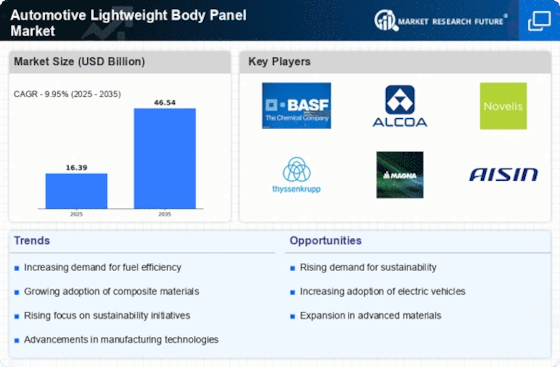Top Industry Leaders in the Automotive Light Weight Body Panel Market
*Disclaimer: List of key companies in no particular order
Top listed companies in the Automotive Light Weight Body Panel industry are:
Austem Company Ltd (Korea), ArcelorMittal S.A. ( Luxembourg), Hwashin Tech Co Ltd (South Korea), BASF SE (Germany), Alcoa Corporation (U.S.), Plastic Omnium (France), Magna International Inc(Canada), ThyssenKrupp AG (Germany), Kuante Auto Parts Manufacture Co. Limited(China)
Competitive Landscape of the Automotive Lightweight Body Panel Market: Shifting Gears
The automotive industry is revving up its engine towards increased fuel efficiency and reduced emissions, fueled by stringent regulations and a growing eco-conscious consumer base. One key strategy in this race is shedding weight, and lightweight body panels are taking center stage. This nascent market is witnessing a dynamic interplay between established players and agile newcomers, each vying for a slice of the pie.
Key Players and Strategies:
Traditional Automakers: Giants like Ford, GM, and Toyota are leveraging their existing infrastructure and expertise to integrate lightweight materials like aluminum, magnesium, and advanced composites into their vehicles. Toyota's TNGA platform and Ford's F-150 with an aluminum body are testament to this trend. Their focus lies on optimizing production processes and driving down costs to make lightweight solutions commercially viable.
Tier 1 Suppliers: Bosch, Magna International, and Faurecia are actively developing and supplying lightweight body panels and components. These players are investing heavily in research and development, focusing on innovative materials and forming strategic partnerships with automakers and material providers.
Material Specialists: Novelis, Arconic, and UACJ are at the forefront of material advancement, constantly pushing the boundaries of strength, weight, and recyclability. Their strategies involve collaborations with automakers and suppliers to tailor material solutions for specific applications.
Start-ups and Disruptors: Small, agile companies like Impossible Composites and Arup are bringing game-changing technologies to the table. Impossible Composites' continuous fiber reinforced thermoplastic composites offer exceptional strength and formability, while Arup's biomimetic design principles are being applied to optimize panel structures. These disruptors are shaking up the traditional landscape with their fresh perspectives and rapid innovation.
Factors for Market Share Analysis:
Technology Leadership: Companies with a strong pipeline of innovative materials and manufacturing processes hold an edge.
Cost Competitiveness: Balancing performance with affordability is crucial, as lightweight solutions often carry a premium price tag.
Production Capacity and Scalability: Efficient and high-volume production capabilities are essential for meeting the growing demand.
Strategic Partnerships and Collaborations: Forging alliances with automakers, material suppliers, and research institutions fosters rapid advancement and market penetration.
Regional Focus: Understanding and catering to the specific regulations and consumer preferences in different regions is key.
New and Emerging Trends:
Hybrid Materials: Blending lightweight metals with carbon fiber or other composites are creating panels with superior strength-to-weight ratios.
Additive Manufacturing: 3D printing technology is enabling the production of complex, lightweight panels with customized designs, opening up new possibilities for vehicle aerodynamics and weight reduction.
Recyclability and Sustainability: Focus is shifting towards developing eco-friendly materials and closed-loop recycling processes to minimize environmental impact.
Digitalization and AI: Integrating digital tools and AI-powered design optimization is streamlining the development and production of lightweight panels.
The automotive lightweight body panel market is a dynamic and rapidly evolving space. While established players hold a significant chunk of the market share, innovative newcomers are challenging the status quo with disruptive technologies and agile approaches. Success will hinge on a combination of factors, including technological prowess, cost efficiency, strategic partnerships, and a keen understanding of evolving trends and regulations. The race for lighter, greener vehicles is on, and the companies that adapt and innovate the fastest will be the ones driving the future of this exciting market.
Latest Company Updates:
Austem Company Ltd (Korea):
- Date: November 15, 2023
- Source: Austem Company Ltd press release
- Development: Announced mass production of high-strength aluminum sheets for automotive body panels using their proprietary "Ausform" technology.
ArcelorMittal S.A. (Luxembourg):
- Date: October 26, 2023
- Source: Automotive News Europe
- Development: Partnered with Ford to supply ultra-high-strength steel (UHSS) for the new Ford Bronco.
Hwashin Tech Co Ltd (South Korea):
- Date: September 5, 2023
- Source: Asian Metal
- Development: Developed a new magnesium alloy for automotive body panels with improved formability and corrosion resistance.
BASF SE (Germany):
- Date: August 10, 2023
- Source: BASF website
- Development: Launched a new range of engineering plastics specifically designed for lightweight automotive parts.










